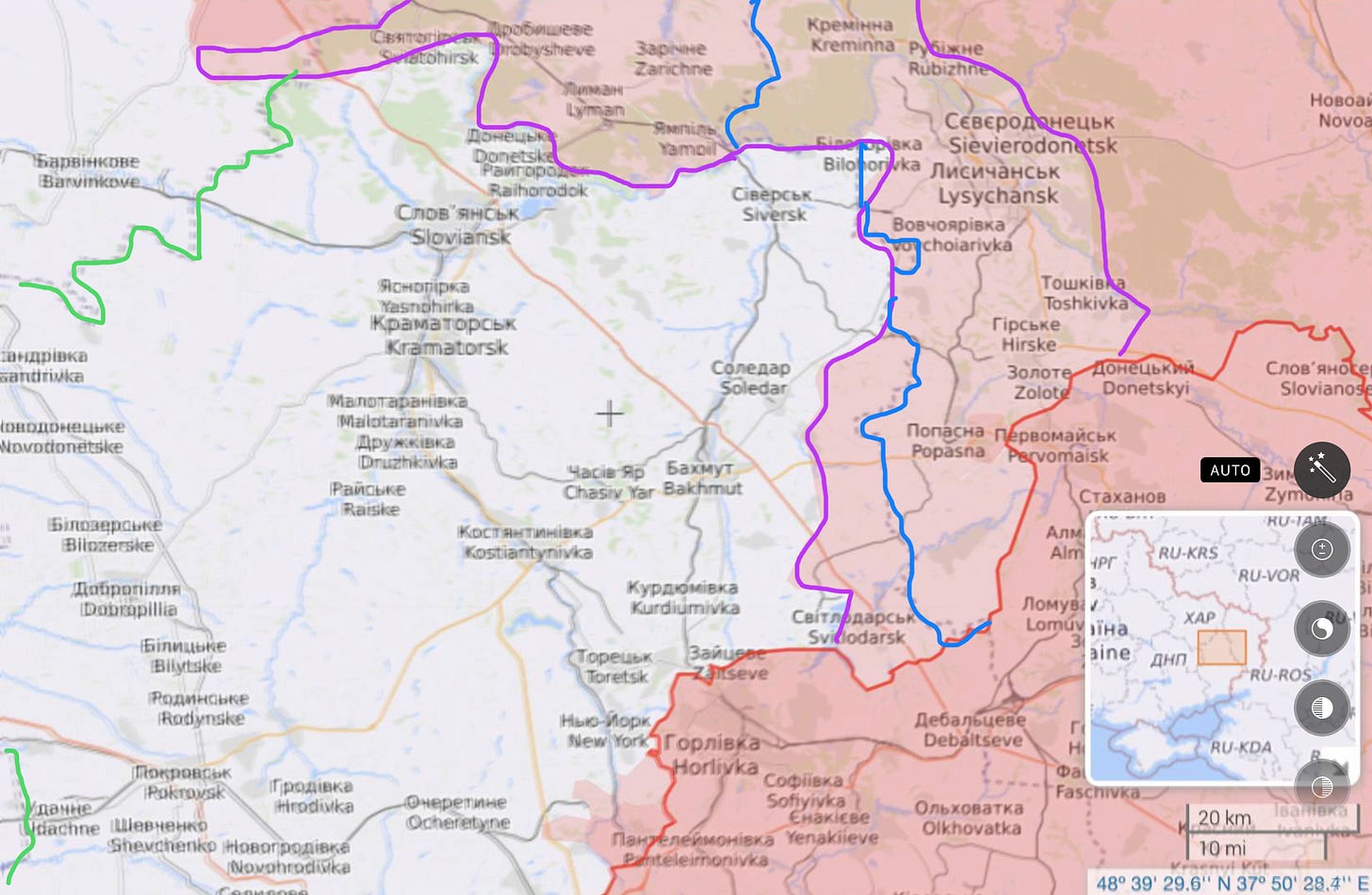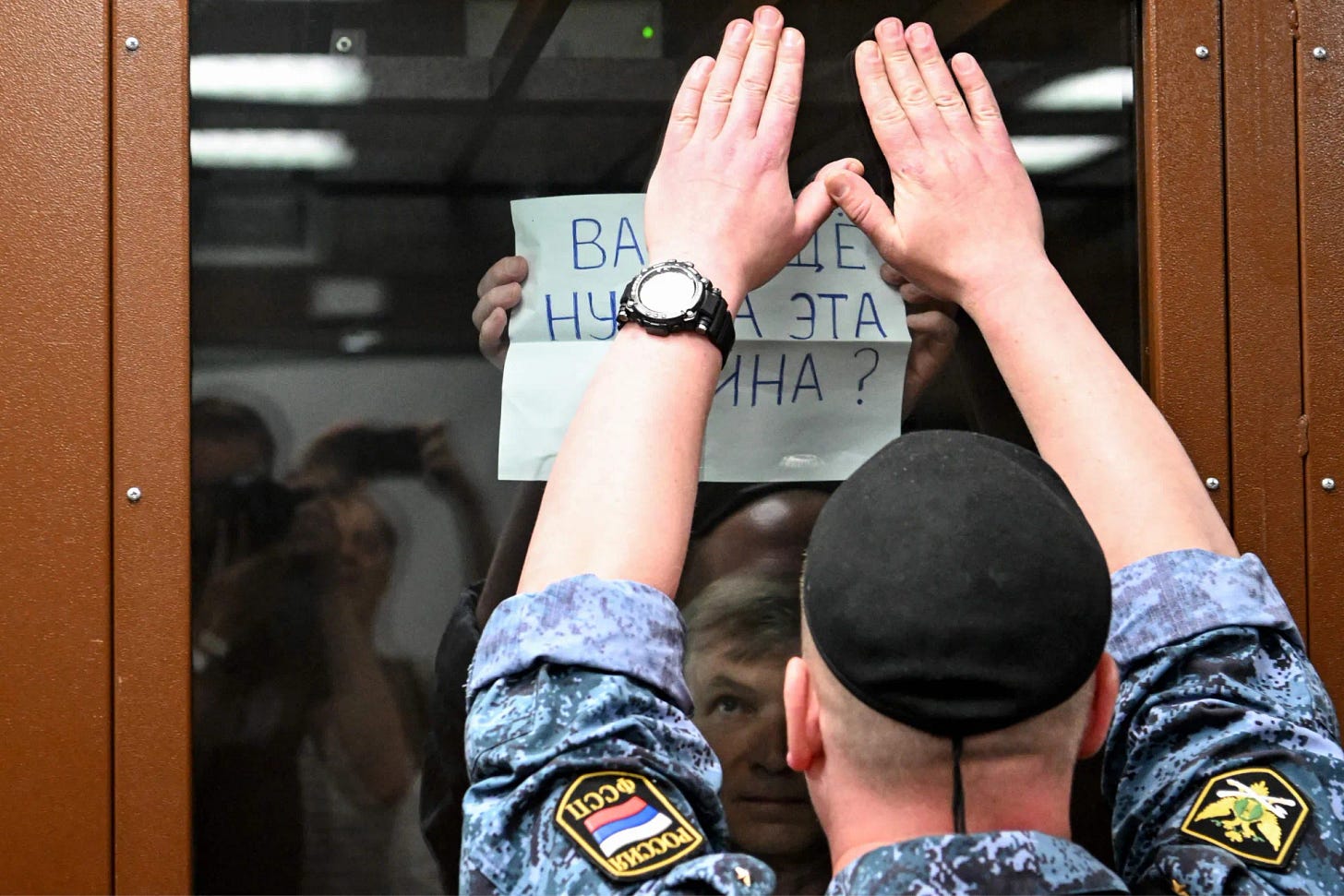July 11, 2022
I have recovered from COVID and hope to return to my everyday work schedule. Today’s issue will be a little different from the usual: In it, you may find a story about events that happened a few days ago that you may have already heard about. But I felt it necessary to capture moments that I think will have lasting significance.
Micro aim achieved
The government can do anything!
Repressions must be terrible
Governors are in charge of recruiting
Oversight and control
Sanctions are working
… and are lifted
There is a record
Taking back control in Russia
No one dared to complain about Kremlin
China has opened up
Micro aim achieved
After two-and-a-half months of constant offensive using “Syrian tactics”—destroying with artillery fire all buildings and structures in the city and then capturing them—the Russian army was able to accomplish one of the combat objectives set by Vladimir Putin: Virtually the entire territory of Luhansk oblast of Ukraine has come under Russian control. Now we should expect that the main strike of the occupiers will fall on the cities of Sloviansk, where the primary sources of water supply for the entire Donbas are located, and Bakhmut, which is the most important logistical point.

After receiving a limited number of modern Western artillery systems, the Ukrainian army is launching many spot strikes against Russian army ammunition depots, but this has not yet affected the overall balance of forces.
The government can do anything!
In two days, the State Duma passed a government bill on supporting the Russian Armed Forces, other troops, and military formations when conducting counterterrorist and other operations outside Russia. As is often the case, “We wanted what was best, but it was the same as
usual” (the favorite aphorism pronounced by the former prime minister Victor Chernomyrdin).
The law’s authors intended to facilitate the system of conclusion and revision of state contracts in the conditions of war with Ukraine. The Russian legislation on state contracts is designed so that following all the rules can stretch out the conclusion of any contract for several months and make it virtually impossible to change it. When the Russian army’s repair or supply needs change hourly, such a bureaucratic regime can stop the war before the Kremlin wants it to.
At the same time, a literal reading of the law allows us to see in this law the possibility of total state control over all economic activity in the country: The text of the law does not contain any restrictions on the sectors in which this law can be applied, and the government gets the opportunity to do whatever it wants.
The Government of the Russian Federation may adopt decisions on the introduction of special measures in the sphere of the economy, including those providing... for actions carried out by federal executive authorities, executive authorities of subjects of the Russian Federation, local self-government bodies and organizations, the procedure for their financing, and logistical support.
In case the Government of the Russian Federation adopts a decision [to introduce special measures]... legal entities, regardless of their organizational and legal status and form of ownership, may not refuse to conclude... agreements, state contracts for the supply of goods, the performance of works, rendering services to support counterterrorism and other operations outside the territory of the Russian Federation by the Armed Forces of the Russian Federation, other troops, military formations and bodies.
I do not know when and how the Russian authorities intend to use this law. Still, I am well aware that, relying on its norms, the government can do everything, from requiring companies to supply metals to produce weapons to food supplies for soldiers at the front and in the rear.
Repressions must be terrible
On July 8, the District Court Judge in one of Moscow districts Olesya Mendeleeva found 60-year-old municipal deputy Alexei Gorinov guilty of spreading “fakes” about the Russian army.
Alexei Gorinov was born and raised in Moscow. In 1984, he graduated from the Moscow Institute of Engineers of Geodesy, Aerial Photography and Cartography of the Order of Lenin, and in 2004, the Moscow State Law Academy. He was engaged in scientific activities and taught. He was a human rights activist, regularly visiting detained activists in police stations and courts and helping them as a public defender. In 2017, as a self-nominated candidate, Alexei Gorinov was elected deputy of the Krasnoselsky Council of Deputies in Moscow.
On March 15, 2022, there was a meeting of this council, at which Gorinov said that which he was convicted of:
What kind of children’s drawing contest can we talk about, time for Children’s Day, or organizing dance programs timed for Victory Day, when we have children dying every day? I will tell you for information that about a hundred children died in Ukraine, and children became orphans. And grandchildren and great-grandchildren of participants of the Second World War are now thrown into the thick of these hostilities on the territory of Ukraine.
I believe that all the efforts of civil society should be aimed only at stopping the war and withdrawing Russian troops from the territory of Ukraine.
Elena Kotenochkina, another member of the same council, supported Gorinov. On April 25, criminal charges were filed against both of them. Kotenochkina had fled abroad shortly before (she was arrested in absentia and placed on the international wanted list). At the same time, Gorinov stayed in Russia—and five days later, on May 1, he was indicted in the final version.
The investigation believes that the two deputies entered into “a preliminary criminal conspiracy,” “allocated criminal roles between them,” and “developed a common plan to commit a crime. And then, at the deputies’ meeting, they “discredited” the Russian army, “using their official position,” “guided by the motive of political hatred,” and “foreseeing the imminent onset of socially dangerous consequences,” including the fact that their actions would “cause anxiety, fear, apprehension, and insecurity on the part of the state.”
The “deliberately false information” that, according to the investigation, Gorinov disseminated includes, for example, the fact that he identified the war as war and not a “special military operation.” And also the fact that the deputy stated that the actions of the Russian army in Ukraine are aimed at “seizure of its territories,” “liquidation of its independence,” and “change of its political and social system,” and led to the daily death of children there. In addition, the investigation saw fit to add something that was not there and stated that Gorinov allegedly called the actions of the Russian army the actions of a “fascist state.”
Throughout the trial, Gorinov was kept in a glass cage, handcuffed, and held a homemade poster that read, “Do you still need this war?” which the guards tried to close. A year ago, Gorinov had COVID; he was diagnosed with tuberculosis and had part of his lung removed.
This is the first case of criminal punishment on this charge in Russia. The cruel nature of the sentence sets the bar for other courts to consider similar cases. On the other hand, for 15 years now, the main task of Putin’s repressive machine has been to intimidate those Russians who disagree with the policy being pursued. And the Kremlin is getting its way.
Governors are in charge of recruiting
No official mobilization for the war in Ukraine has been announced in Russia. Still, the Kremlin has demanded that regional authorities ensure the recruitment of volunteers to sign contracts to serve in the army.
The Kursk regional administration has announced the formation of a logistics battalion, Seim, to support troops stationed in Ukraine. This battalion will deal with the delivery of fuel, food, ammunition, and everything needed on the front lines. It recruits officers, warrant officers, sergeants, and soldiers.
“When stationed outside our state and depending on the intensity of offensive operations, a soldier can receive from 200,000 to 500,000 rubles ($3,300-$8,300) per month,” the regional administration said in a statement.
Roman Starovoit, the Governor of the Kursk region, held a meeting with the heads of regional administrations where he lamented the low pace of recruitment of volunteers.
It seems to me that there is a lack of awareness. I asked district heads and the Regional Security Committee to get involved in this work. Some districts of Kursk and others are not very active in the campaign. I am convinced that the formation of such a battalion will provide significant support to the Ministry of Defense in fulfilling the combat tasks set by the commander-in-chief.
Oversight and control
One of Russia’s most important forms of bureaucratic pressure on business is the use of oversight organizations. According to Higher School of Economics estimates, in early 2020 in Russia, there were more than 240 types of state control (oversight) and more than six dozen types of “licensing control” at the municipal level. Supervisory organizations and agencies have extensive powers: They can stop the activities of companies and apply to the courts with similar demands, block bank accounts, levy fines, etc. Russian authorities actively use their capabilities to solve their tasks. The decisions of the supervisory authorities have halted imports of goods from neighboring countries, stopped the implementation of investment projects worth tens of billions of dollars to redistribute shares in favor of state companies (Sakhalin-2), and taken the largest oil and gas deposits away from companies, and destroyed competitors.
Since the beginning of the Russian invasion of Ukraine, the Kazakh authorities have stated that they do not support Moscow’s policy and do not intend to help Russia circumvent Western sanctions. Everything has its own price. In March, Deputy Prime Minister Victoria Abramchenko ordered an assessment of the technical condition of the CPC production facilities in the port of Novorossiysk and compliance with environmental requirements. As a result of the inspection, Rostransnadzor identified “several documentary violations” [claims to the execution of internal documents of the company] for the liquidation of emergency oil spills. On June 6, Rostransnadzor issued an order to eliminate the violations by November 30.
Two weeks after that, Kazakh President Kassym-Jomart Tokayev, speaking at a forum in St. Petersburg, made it very clear that his country would not recognize the independence of the self-proclaimed republics in eastern Ukraine as the Georgian territories, South Ossetia and Abkhazia. Immediately after that, Rostransnadzor filed a lawsuit to halt the operations of the CPC sea terminal for three months. On July 5, the district court of Novorossiysk shut down the oil terminal for 30 days.
The court decision resulted in 1 million-1.5 million barrels of oil (1%-1.5% of global consumption) ceasing to reach the global market. The Kremlin was bombarded with accusations of wanting to destabilize the global oil market. And already, on Monday, July 11, the Krasnodar Regional Court reversed the decision of the district court to halt the operation of the terminal and replaced it with a fine of 200,000 rubles ($3,300).
The next victim of Russian regulatory activity will be the oil and gas company Shell, which in late February announced its intention to withdraw from joint ventures with Gazprom, including Sakhalin-2, the first production-sharing agreement in Russian history.
On July 2, Vladimir Putin signed a decree nationalizing the assets of Sakhalin-2, handing them over to a company owned by the Russian government. In principle, the Russian Civil Code allows nationalization based on a specially adopted law and with mandatory “compensation for the value of this property and other losses.” But, of course, no law has been passed in this case. The payment of compensation to former shareholders who do not want to become participants in the new company will be arranged in a particular way: Their shares will be sold by the government at its discretion, and the amount of environmental damage, which no one knows today but which will be identified, will be deducted from the amounts received. Need I say that Gazprom, a participant in Sakhalin-2, will get its share in the new company immediately without paying any penalties?
Sanctions are working
Deputy Prime Minister Yuri Trutnev admitted that oil production in the Sakhalin-1 project had stopped after the project operator, U.S. ExxonMobil, withdrew its specialists. According to Trutnev, the output of Sakhalin-1 “due to the restrictions” decreased by 22 times, from 220,000 to 10,000 barrels per day, which could lead to the fact that in 2023 Sakhalin’s budget will not receive 26% of revenues.
The government doesn’t know what to do because it can’t operate the equipment in the field without American specialists.
… and are lifted
The Government of Canada made an exception to the sanctions regime. It allowed Siemens to return to Russia after repairing turbines for the compressor station of the Nord Stream-1 gas pipeline. To me, this decision reflects that Western countries have reached a qualitative limit in building up sanctions pressure on Russia and are not ready to move forward.
Nord Stream 1 is the most important conduit for Russian gas to Germany, and the 60% drop in capacity has created significant problems for the German economy. But we should not forget that German companies could have demanded that Gazprom increase its gas exports to Germany via Ukraine. If the sanctions were to show the Kremlin its actual degree of dependence on the global world, stopping Nord Stream 1 completely could have been a good example. But it won’t be now.
There is a record
The Bank of Russia has published an assessment of the balance of payments for the first half of the year, which did not bring any surprises. Exports snowballed, thanks to high oil and gas prices. In the second quarter, imports fell 12.5% from a year earlier and were at 2015-2016 levels. Although Russian oil companies under-received about $70 billion from discounts on the price of exported oil, this did not prevent the current account balance from setting a historical record of $70 billion per quarter (since 1994, the annual current account balance has exceeded this mark only eight times). Given that most capital transactions are now prohibited in Russia, this well explains the reasons for the strengthening of the ruble.
Taking back control in Russia
Vladimir Potanin, the President and principal shareholder of Norilsk Nickel (20% of the world’s nickel, 45% of the world’s palladium, 10% of the world’s platinum, 7% of the world’s copper), announced his agreement to negotiate a merger with Rusal (15% of the world’s aluminum, not including China). From the point of view of business, such a merger does not look obvious—Norilsk Nickel is steadily paying high dividends, and RUSAL has been 15 years in climbing out of the debt pit it hit before the 2008 crisis. There is no operational synergy between the companies, as Potanin said bluntly. But, he added, this merger “will add to our sanctions resilience.”
In 2018, RUSAL’s largest shareholder, Oleg Deripaska, came under U.S. sanctions, and the management of its shares was taken over by lawyers not affiliated with Russia. It seems the Kremlin felt that in conditions of strategic confrontation with the West, it could not allow control over one of the country’s largest enterprises to be held outside of Russia. In this regard, the merger with Nornikel will break the structure built in 2018.
No one dared to complain about Kremlin
The Russian association of cancer patients, Hello, and the public organization Cancer Curable complained to the European Coalition of Cancer Patients and the Russian Ministry of Health about the actions of the American biopharmaceutical company Bristol Myers Squibb (BMS). Having announced its withdrawal from the Russian market, BMS also is withdrawing from medical institutions and plans to destroy anti-tumor drugs for international multicenter clinical trials. We are talking about the immuno-oncology drug OPDIVO (nivolumab), registered in Russia in 2016 to treat three malignant tumors: certain melanomas, lung cancer, and adult renal cell cancer. In Russia, BMS conducted clinical trials of the drug to expand its scope. The cumulative number of participants in the active clinical trials is 165.
After Russian troops invaded Ukraine, global pharmaceutical manufacturers, including BMS, suspended the enrollment of Russian participants in clinical trials of the newest drugs and announced that they would not start new drug trials. The companies explained the suspension of research activities not by politics but by logistical problems.
Have you already guessed that neither organization called on the Russian authorities to stop the war against the neighboring country so that Russian patients could receive modern treatments?
China has opened up
At the end of May, Chinese aviation authorities closed the airspace to Boeing and Airbus Russian carriers that had been transferred from foreign registries to Russian ones.
At the same time, because Aeroflot owns several A330s, the company has received permission for their regular flights to Chengdu, China, beginning July 22.







